译林版英语7年级(上册)知识点汇总
译林版初中英语七年级上册期中复习Units1-4单元知识点梳理归纳
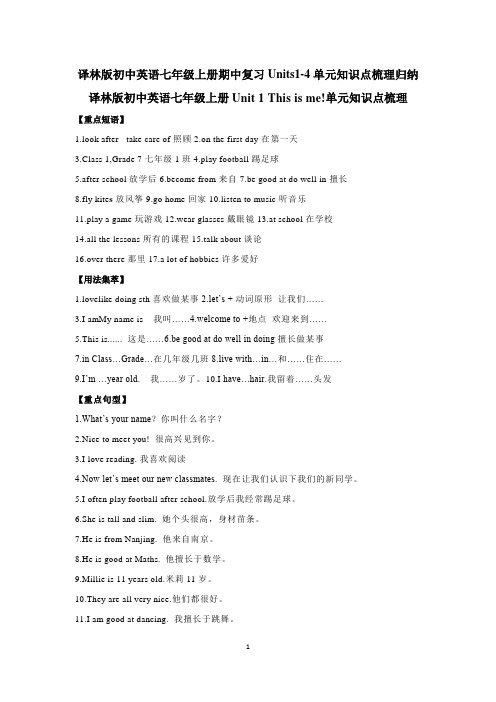
译林版初中英语七年级上册期中复习Units1-4单元知识点梳理归纳译林版初中英语七年级上册Unit 1 This is me!单元知识点梳理【重点短语】1.look after take care of 照顾2.on the first day 在第一天3.Class 1,Grade 7 七年级1班4.play football 踢足球5.after school 放学后6.become from 来自7.be good at do well in 擅长8.fly kite s 放风筝9.go home 回家10.listen to music 听音乐11.play a game 玩游戏12.wear glasses 戴眼镜13.at school 在学校14.all the lessons 所有的课程15.talk about 谈论16.over there 那里17.a lot of hobbies 许多爱好【用法集萃】1.lovelike doing sth 喜欢做某事2.let’s +动词原形让我们……3.I amMy name is 我叫……4.welcome to +地点欢迎来到……5.This is...... 这是……6.be good at do well in doing擅长做某事7.in Class…Grade…在几年级几班8.live with…in…和……住在……9.I’m …year old. 我……岁了。
10.I have…hair.我留着……头发【重点句型】1.What’s your name?你叫什么名字?2.Nice to meet you! 很高兴见到你。
3.I love reading. 我喜欢阅读4.Now let’s meet our new classmates. 现在让我们认识下我们的新同学。
5.I often play football after school.放学后我经常踢足球。
牛津译林版英语七年级上册单元知识点归纳1-4单元
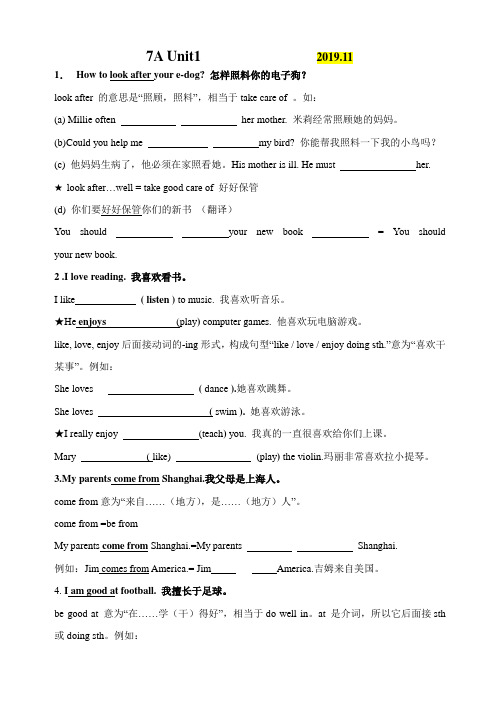
7A Unit1 2019.111.How to look after your e-dog? 怎样照料你的电子狗?look after 的意思是“照顾,照料”,相当于take care of 。
如:(a) Millie often her mother. 米莉经常照顾她的妈妈。
(b)Could you help me my bird? 你能帮我照料一下我的小鸟吗?(c) 他妈妈生病了,他必须在家照看她。
His mother is ill. He must her.★ look after…well = take good care of 好好保管(d) 你们要好好保管你们的新书(翻译)You should your new book = You should your new book.2 .I love reading. 我喜欢看书。
I like ( listen ) to music. 我喜欢听音乐。
★He enjoys(play) computer games. 他喜欢玩电脑游戏。
like, love, enjoy后面接动词的-ing形式,构成句型“like / love / enjoy doing sth.”意为“喜欢干某事”。
例如:She loves ( dance ).她喜欢跳舞。
She loves( swim ).她喜欢游泳。
★I really enjoy (teach) you. 我真的一直很喜欢给你们上课。
Mary ( like) (play) the violin.玛丽非常喜欢拉小提琴。
3.My parents come from Shanghai.我父母是上海人。
come from意为“来自……(地方),是……(地方)人”。
come from =be fromMy parents come from Shanghai.=My parents Shanghai.例如:Jim comes from America.= Jim America.吉姆来自美国。
译林版七年级上册英语知识点归纳
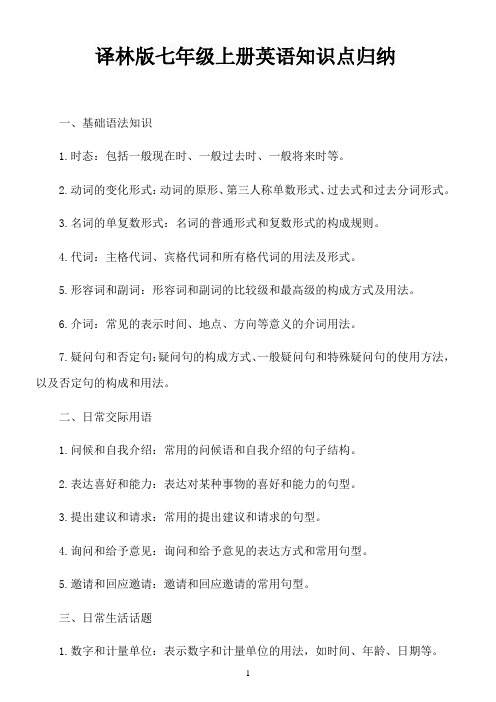
译林版七年级上册英语知识点归纳一、基础语法知识1.时态:包括一般现在时、一般过去时、一般将来时等。
2.动词的变化形式:动词的原形、第三人称单数形式、过去式和过去分词形式。
3.名词的单复数形式:名词的普通形式和复数形式的构成规则。
4.代词:主格代词、宾格代词和所有格代词的用法及形式。
5.形容词和副词:形容词和副词的比较级和最高级的构成方式及用法。
6.介词:常见的表示时间、地点、方向等意义的介词用法。
7.疑问句和否定句:疑问句的构成方式、一般疑问句和特殊疑问句的使用方法,以及否定句的构成和用法。
二、日常交际用语1.问候和自我介绍:常用的问候语和自我介绍的句子结构。
2.表达喜好和能力:表达对某种事物的喜好和能力的句型。
3.提出建议和请求:常用的提出建议和请求的句型。
4.询问和给予意见:询问和给予意见的表达方式和常用句型。
5.邀请和回应邀请:邀请和回应邀请的常用句型。
三、日常生活话题1.数字和计量单位:表示数字和计量单位的用法,如时间、年龄、日期等。
2.学校生活:学校相关的词汇和句子,如课程安排、校园设施等。
3.家庭成员和职业:家庭成员的称呼和常见职业的英文表达。
4.食物和饮料:常见食物和饮料的名称及描述。
5.时间和活动:描述日常活动的词汇和句子,如日常作息、爱好等。
6.交通工具和旅行:常见交通工具的名称和旅行相关的词汇。
7.购物和支付:购物场景中常用的词汇和句子,如购物用语、货币单位等。
四、阅读理解技巧1.主旨概括:通过阅读文章,抓住文章的主旨和中心思想。
2.推理判断:根据文章中的信息进行推理和判断。
3.词汇猜测:通过上下文的提示,猜测词语的意思。
4.阅读策略:如扫读、略读等阅读技巧的应用。
以上是《译林版七年级上册英语知识点归纳》的简要总结。
希望同学们能够根据这些知识点进行系统学习和复习,提高自己的英语水平。
同时,建议同学们多做练习题和阅读理解,以加深对知识点的理解和运用。
译林版七年级英语上册复习知识点

译林版七年级英语上册复习知识点知识不需要对“成功”负责,需要对成功负责的东西,叫技能。
然而现在很多人,分不清两者的区别。
下面小编给大家分享一些译林版七年级英语上册复习知识,希望能够帮助大家,欢迎阅读!译林版七年级英语上册复习知识1Units1--4重点知识点总结n.名词 v.动词 vt.及物动词 vi.不及物动词 adj.形容词adv.副词 prep.介词 pron.代词 conj.连词1、喜欢like / love / enjoy / be interested in / be crazy about (痴迷于)/ have fun / have a good time +doing sth.动词+doing 的还有Go doing sth. / finish doing sth./Be good at doing sth./ do well in doing sth.How/what about doing sth./practise doing sth.2、“四大看”read vt.看读物(read books/newspaper/magazines/a map等) look vi. 瞧常用短语look at/ for/around/after/out/over/upsee vt.看见,强调结果 I can see you.watch vt.带有欣赏性的观看watch TV/ a film / a football game3、“五大穿着”Put on 强调“穿上”的动作eg. He ____a coat and goes for a walk.Wear 强调“穿着”的状态;进行时态表示暂时的情况eg. She is wearing a new skirt now. / wear glassesDress (1) dress sb. (2) dress oneself (3) dress up as (4) get dressedIn (穿戴)后接颜色(或衣服),表示状态look!Lucy is_____a red skirt and a pair of pink shoes.On 后接人指衣服穿在某人身上看出区别来。
七年级上册英语译林版知识点
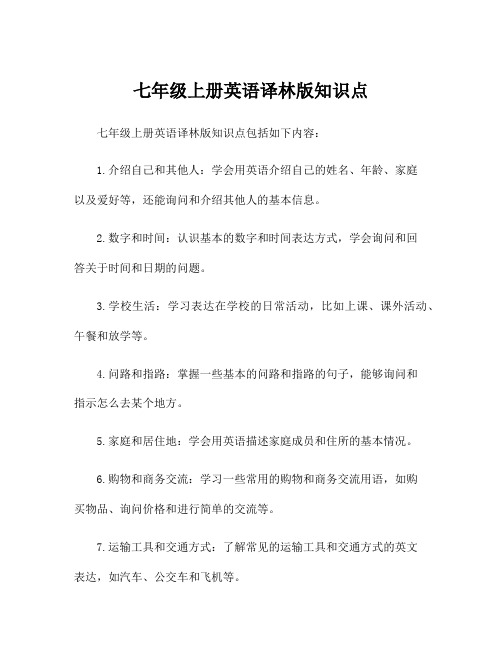
七年级上册英语译林版知识点
七年级上册英语译林版知识点包括如下内容:
1.介绍自己和其他人:学会用英语介绍自己的姓名、年龄、家庭
以及爱好等,还能询问和介绍其他人的基本信息。
2.数字和时间:认识基本的数字和时间表达方式,学会询问和回
答关于时间和日期的问题。
3.学校生活:学习表达在学校的日常活动,比如上课、课外活动、午餐和放学等。
4.问路和指路:掌握一些基本的问路和指路的句子,能够询问和
指示怎么去某个地方。
5.家庭和居住地:学会用英语描述家庭成员和住所的基本情况。
6.购物和商务交流:学习一些常用的购物和商务交流用语,如购
买物品、询问价格和进行简单的交流等。
7.运输工具和交通方式:了解常见的运输工具和交通方式的英文
表达,如汽车、公交车和飞机等。
8.美食和饮食文化:学习一些常见的食物和饮食文化的英语表达,如点菜、询问口味和介绍菜单等。
9.谈论天气和季节:学会用英语询问和讨论天气和季节的情况,
如天气如何、喜欢哪个季节等。
10.个人喜好和爱好:学会用英语表达个人的喜好和爱好,包括喜
欢的颜色、动物、运动和音乐等。
以上是七年级上册英语译林版的一些主要知识点,希望能对你有
所帮助。
新译林版七年级(上册)英语全册知识点归纳总结
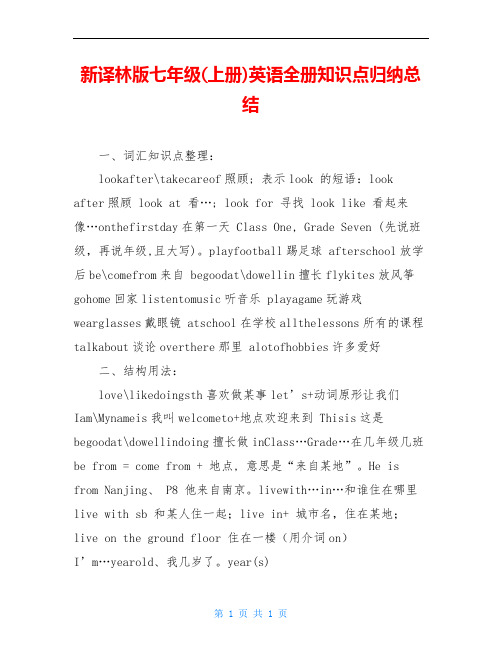
新译林版七年级(上册)英语全册知识点归纳总结一、词汇知识点整理:lookafter\takecareof照顾; 表示look 的短语:look after照顾 look at 看…; look for 寻找 look like 看起来像…onthefirstday在第一天 Class One, Grade Seven (先说班级,再说年级,且大写)。
playfootball踢足球 afterschool放学后be\comefrom来自 begoodat\dowellin擅长flykites放风筝gohome回家listentomusic听音乐 playagame玩游戏wearglasses戴眼镜 atschool在学校allthelessons所有的课程talkabout谈论overthere那里 alotofhobbies许多爱好二、结构用法:love\likedoingsth喜欢做某事let’s+动词原形让我们Iam\Mynameis我叫welcometo+地点欢迎来到 Thisis这是begoodat\dowellindoing擅长做inClass…Grade…在几年级几班be from = come from + 地点, 意思是“来自某地”。
He is from Nanjing、 P8 他来自南京。
livewith…in…和谁住在哪里live with sb 和某人住一起;live in+ 城市名,住在某地;live on the ground floor 住在一楼(用介词on)I’m…yearold、我几岁了。
year(s)old ,……岁,如果数词大于1, year 要用复数years、问年龄要用How old “几岁”提问。
例如:- is your sister?- She is11、应填How old、Ihave (short/long)hair、我留着短(长)头发三、句式用法What’syourname?你叫什么名字?Nicetomeetyou!很高兴见到你。
(完整版)苏教版新译林英语7年级上册语法总结
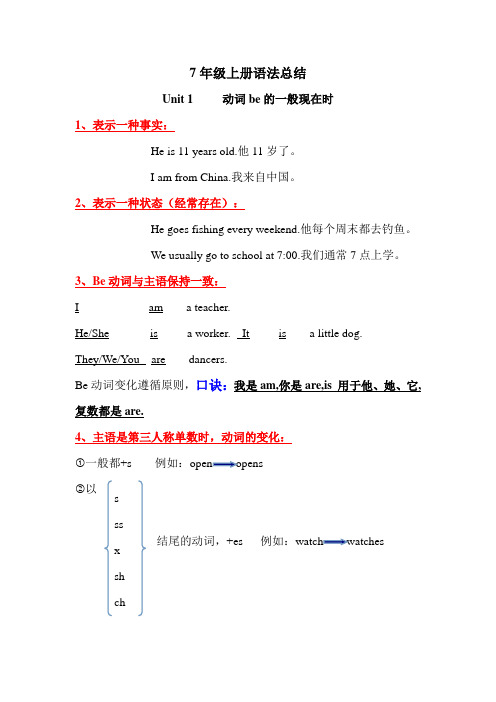
7年级上册语法总结Unit 1 动词be 的一般现在时1、表示一种事实:He is 11 years old.他11岁了。
I am from China.我来自中国。
2、表示一种状态(经常存在):He goes fishing every weekend.他每个周末都去钓鱼。
We usually go to school at 7:00.我们通常7点上学。
3、Be 动词与主语保持一致: I am a teacher.He/She is a worker. It is a little dog. They/We/You are dancers.Be 动词变化遵循原则,口诀:我是am,你是are,is 用于他、她、它,复数都是are.4、主语是第三人称单数时,动词的变化: ①一般都+s 例如:②以结尾的动词,+es 例如:watch watchessssxshch③ 辅音字母+y 结尾的动词,ies 例如:④辅音字母+o 结尾的动词,+es 例如:goes5、一般现在时的句型转换 ①否定句be+notShe is in the kitchen.~She is not in the kitchen.They are in the classroom.~They are not in the classroom. ②一般疑问句be 提前She is in the kitchen.~Is she in the kitchen?——Yes ,she is. ——No ,she isn ’t. They are in the classroom.~Are they in the classroom ? ——Yes ,they are. ——No ,they aren ’t.Unit 2 行为动词的一般现在时1、行为动词形式变化2、句型转换①否定句:do+not/does +notYou don’t go to school on Sunday.He doesn’t work in this shop.②句首添加do/doesDo you play basketball after school?Does John speak Chinese?Unit 3 人称代词1、我们常用人称代词表示人或物2、人称代词主格、宾格形式3、主格在句中做主语,一般用在动词前宾格在句中做宾语,一般用在动词、介词后4、有好几个人称代词并列出现时,顺序如下:单数:231原则——you、he and I复数:123原则——we、you and theyUnit 4 表示时间的介词in、on、at频度副词:always>usually>often>sometimes>seldom>neverUnit 5 特殊疑问句注意:when和what time的区别What time询问的是具体时间,when可以是具体时间也可以是大体时间。
(完整版)苏教版新译林英语7年级上册语法总结
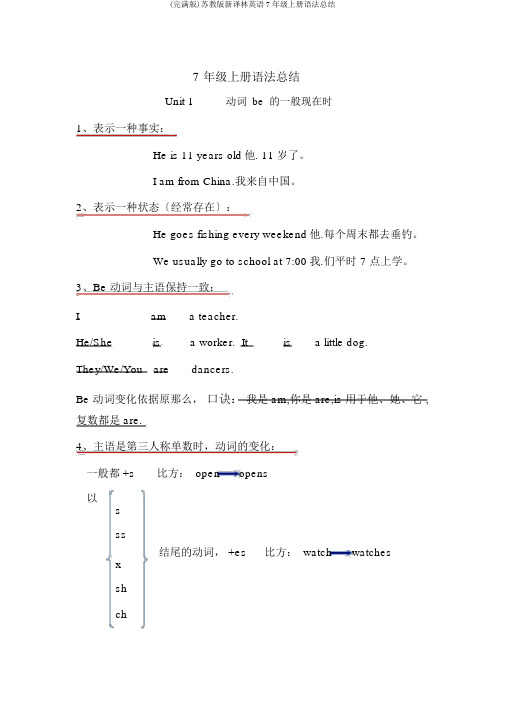
7年级上册语法总结Unit 1动词be的一般现在时1、表示一种事实:He is 11 years old他. 11 岁了。
I am from China.我来自中国。
2、表示一种状态〔经常存在〕:He goes fishing every weekend他.每个周末都去垂钓。
We usually go to school at 7:00我.们平时 7 点上学。
3、Be 动词与主语保持一致:I am a teacher.He/She is a worker. It is a little dog.They/We/You are dancers.Be 动词变化依据原那么,口诀:我是 am,你是 are,is 用于他、她、它 , 复数都是 are.4、主语是第三人称单数时,动词的变化:一般都 +s比方:open opens以sss结尾的动词, +es比方:watch watches xshch辅音字母 +y 结尾的动词, y ies比方:study studies④辅音字母 +o 结尾的动词, +es比方:go goes5、一般现在时的句型变换否认句 be+notShe is in the kitchen.~She is not in the kitchen.They are in the classroom.~Theyare not in the classroom.一般疑问句 be 提前She is in the kitchen.~Is she in the kitchen?—— Yes,she is.—— No,she isn’t.They are in the classroom.~Are they in the classroom?—— Yes,they are.—— No,they aren’t.Unit 2行为动词的一般现在时用法例句I go to school at 7:00 every morning.经常性、习惯性的动作The earth moves around the sun客观事实目前的爱好、能力等She sings very well.1、行为动词形式变化主语行为动词第一人称复数〔we〕/第二人称复原形数〔you〕/第三人称复数〔They〕例句We do our homeworkat home.You have lunch at school. They play basketball after school.第三人称单数〔 He、She、It 〕2、句型变换否认句: do+not/does +not 第三人称单She does her 数homework in theevening.You don’tgo to school on Sunday.He doesn’twork in this shop.句首增加 do/doesDo you play basketball after school?Does John speak Chinese?Unit 3人称代词1、我们常用人称代词表示人或物2、人称代词主格、宾格形式单数复数主格宾格主格宾格第一人称I Me We Us第二人称You You You YouHe Him They Them 第三人称She HerIt It3、主格在句中做主语,一般用在动词前宾格在句中做宾语,一般用在动词、介词后4、有好几个人称代词并列出现时,序次以下:单数: 231 原那么—— you、he and I复数: 123 原那么—— we、you and theyUnit 4表示时间的介词 in、on、at介词用法例子in一天中的早 /中/晚 In the morning/afternoon/evening月份In January/February/March/April季节In Spring/Summer/Autumn/Winter年份In 2021/2021on星期On Sunday/Monday/Tuesday某一天On 1 September某一天的早 /中/晚 On a cold morning/Sunday afternoon特定节日 /一天On Children’s Dayat某一时辰At 8:00年龄At 12 years old频度副词:always>usually>often>sometimes>seldom>neverUnit 5特别疑问句特别疑问词含义例句what什么What‘s your name?Class/grade哪个班级、年级What class/grade are you in? what colour什么颜色What colour do you like?time几点What time is it?when什么时候When do you usually get up? where哪里Where do you live?who谁Who is the man in a blue sweater?why为什么Why are you always late for school?whose谁的Whose pen is this?which哪一个Which is better,the red one or the blue one?how怎么样How do you go to school?many多少〔可数〕How many students are there in your class?much多少〔不能数〕How much milk do you drinkevery day?old几岁How old are you?how often多长时间一次How often do you go to the library?long多长How long is the Yangtze River?多久How long do you watch TVevery day?far多远How far is your home from school?tall多高How tall is the building?注意: when 和 what time 的差异What time 咨询的是详尽时间, when 能够是详尽时间也能够是大体时间。
- 1、下载文档前请自行甄别文档内容的完整性,平台不提供额外的编辑、内容补充、找答案等附加服务。
- 2、"仅部分预览"的文档,不可在线预览部分如存在完整性等问题,可反馈申请退款(可完整预览的文档不适用该条件!)。
- 3、如文档侵犯您的权益,请联系客服反馈,我们会尽快为您处理(人工客服工作时间:9:00-18:30)。
Unit one短语归纳:look after \ take care of 照顾on the first day 在第一天Class 1,Grade 7 7年级1班 play football 踢足球after school 放学后 be\come from 来自be good at \do well in 擅长 fly kite s 放风筝go home 回家 listen to music 听音乐play a game 玩游戏 wear glasses 戴眼镜at school 在学校 all the lessons 所有的课程talk about 谈论 over there 那里a lot of hobbies 许多爱好用法集萃:love\like doing sth 喜欢做某事 let’s +动词原形让我们I am\My name is 我叫 welcome to +地点欢迎来到This is 这是 be good at \do well in doing 擅长做in Class…Grade…在几年级几班 live with…in…和谁住在哪里I’m …year old. 我几岁了。
I have…hair.我留着……头发典句背诵What’s your name?你叫什么名字?Nice to meet you! 很高兴见到你。
I love reading. 我喜欢阅读Now let’s meet our new classmates. 现在让我们认识下我们的新同学。
I often play football after school.放学后我经常踢足球。
She is tall and slim. 她个头很高,身材苗条。
He is from Nanjing. 他来自南京。
He is good at Maths. 他擅长于数学。
Millie is 11 years old.米莉11岁。
They are all very nice.他们都很好。
I am good at dancing. 我擅长于跳舞。
语法:连系动词be 的一般现在时动词be 的三变化 am is are. 我(I)用am ,你(you)用are ,is 用于他(he)她(she)它(it),单数名词用is,复数名词都用are句型结构:1、肯定句:主语+am\is\are … It is a football.2、否定句:主语+am\is\are+not… It is not a football.3、一般疑问句:Am\Is\Are+主语+其他?Is it a football? 回答 Yes, it is. No, it isn’t4、特殊疑问句:疑问句+am/is/are +主语+其他?What’s your name?用be 动词的适当形式填空1、She ________ my cousin. Her name _______ Li Jie.2、Tom and I ________ good friends3、What _____ this in English? It ______ a book4、________ you Jack? Yes, I _______5、What ________ those? They ______ his notebooks.Unit two短语归纳:play sports 做运动 many times a day 一天许多次play football/tennis 踢足球/打网球 talk about 谈论after school 放学后 go swimming 去游泳a member of …中的一员 come from 来自listen to music 听音乐 in the next World Cup 在下届世界杯come true 实现 in one’s free time 在某人的空闲时间live in 住/生活在 read books 看书at/ on weekends=at/on the weekend在周末stay at home 待在家里 a lot of 许多ask sb about sth 问某人某事 on TV 在电视上Watch basketball matches 看篮球比赛 feel great 感觉特棒用法集萃:What about doing sth ?做…怎么样?Enjoy doing sth 喜欢做某事make sb/sth +adj 使某人/某物 make sb to do sth 使某人做某事want to do sth 想要做某事 hope to do sth 希望做某事have fun doing sth 做某事开心典句必背I like walking. 我喜欢散步。
I enjoy swimming.What’s your favourite sport? 我喜欢游泳,他最喜欢的运动是什么?I hope his dream comes true. 我希望他梦想成真。
What does Li Hua do in his free time? 李华在业余时间做什么?What else do you want to do? 你还想做什么其他的事情?Reading is fun. 读书是有趣的事情。
语法:行为动词的一般现在时行为动词的一般现在时的构成:主语+行为动词+(其他)当主语为第三人称单数(he, she, it)时,谓语动词也要用单数形式。
用好一般现在时,时间状态需牢记;主语人称是三单,动词要把-s/-es 添;基本用法要记清,状态习惯经常性。
行为动词的一般现在时的变化1.否定句:主语+ don’t/doesn’t + 动词原形+其他I don’t like bread.He doesn’t often play football.2.一般疑问句:Do/Does + 主语+动词原形+其他Do you often play football? Yes, I am /No, I am notDoes he often play football? Yes, he does/ No, he doesn’t3、特殊疑问句:特殊疑问句+一般疑问句?When do you go to school? I go to school at seven o’clock.动词的三单形式的变化:动词三单现在时,一般在词尾加SS,x,ch,sh,在词尾,直接加上-es词尾若是字母o ,加上-es 不用愁。
词尾是“辅音字母+y” ,先变y为i, 后边再加-es用括号内动词的适当形式填空。
1. He often ________(have) dinner at home.2. Daniel and Tommy _______(be) in Class One.3. We _______(not watch) TV on Monday.4. Nick _______(not go) to the zoo on Sunday.5. ______ they ________(like) the World Cup?6. What _______they often _______(do) on Saturdays?7. _______ your parents _______(read) newspapers every day?8. The girl _______(teach) us English on Sundays.9. She and I ________(take) a walk together every evening.10. There ________(be) some water in the bottle.11. Mike _______(like) cooking.12. They _______(have) the same hobby.13. My aunt _______(look) after her baby carefully.14. You always _______(do) your homework well.15. She _______(go) to school from Monday to Friday.16. The child often _______(watch) TV in the evening.17. How many lessons _________ your classmate _________ (have) on Monday?18.What time _________ his mother _________ (do) the housework?Unit 3短语归纳:on foot 步行 far away from 远离a few 一些,少量 learn about 学得,获知would like sth/to do sth 想要/想要做某事 after class 下课后on this day 在今天 all kinds of 各种各样on the phone 在电话中 look at 看ground floor 底层,一楼 on the wall 在墙上by bus 乘公共汽车 in front of 在……前面let me see 让我看看 go to school 去上学reading room 阅览室 borrow from 从……借……get to school 到达学校 on the Open Day 在开放日用法集萃:Thank you for doing sth 为做某事而感谢你be ready to do sth 准备做某事It takes sb some time to do sth 花费某人多少时间做某事show sb around 领某人参观need to do sth 需要做某事典句必背:Welcome to our school.欢迎来到我们学校。
What’s the date taday?今天几月几号Let’s meet at the school gate at 1:30.让我们1:30 在学校门口会面吧Who’s that man in the white shirt?穿白衬衫的那个男的是谁?There are all kinds of books in our library.在我们图书馆有各种各样的书I’d like to say hello to her.我想向她问好。
Do you borrow books from the library?你从图书馆借书吗?We only have a few classrooms.我们只有几间教室It takes me about an hour to get to school.大约花了我一个小时的时间到达学校。
